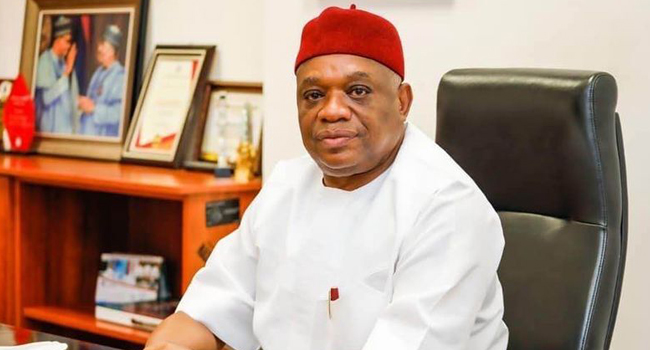On Monday, former governor of Abia State and the lawmaker representing Abia North in the Senate, Orji Kalu, said that the National Assembly has no reason to amend the 1999 Constitution to allow local government autonomy.
According to him, the Supreme Court’s judgment of July 11, 2024, which granted financial autonomy to the 774 local government councils, took care of any possible amendment in that regard.
Kalu said this at a national dialogue on local government and constitution amendment, organised by the House of Representatives Committee on Constitution Amendment in Abuja.
He said: “Let me be honest, if I’m to say, the judgement of the Supreme Court is an amendment of the Constitution. The National Assembly has no reason to amend any section of the Constitution. I’m saying this in my opinion.
“Anywhere in the world, anywhere you have the country’s Supreme Court pronounced on a section of the law that is not nullified that section of the law should be fully implemented. The local government money should go to local government directly now.”
Kalu said that during the tenure of the governors elected in 1999, the state governments had nothing to do with local government funds, and the system worked better, unlike what presently exists.
“President Olusegun Obasanjo was vehement that there should be separation of powers and we maintained that separation of powers that no governor, nobody should touch the funds of the local government. The fund of local government, what we did, was that there was a local government service commission, and local governments worked with local government commissions.
They went to JAC and discussed their programmes.
“They make their budget and their budget was inspected by local government service commission and all the agencies headed by a permanent secretary in the civil service. By then you can see a supervisory councilor can giving contracts to construct culverts. This is not what I’m seeing today. The deputy speaker was a local government chairman, he knows what I’m saying.
They know that the state governments in our time has nothing to with local government money,” he added.
On his part, former governor of Kebbi State and Senator representing Kebbi Central Adamu Aliero said local government councils did very well during their tenure between 1999 and 2003.
“President Olusegun Obasanjo directed that all states should open what we call local government joint account in line with the provisions of the 1999 Constitution where all funds meant for local governments will be channelled into that account.
“In addition, 10% of what the state government generate should be put into that account and the State Assembly. We diligently adhered to the directives given to us. All allocations to the local governments were put into the joint account.
“Local governments were doing very well during our own tenure.
Every expenditure above N500,000 was normally approved by the Department of Local Government, and we didn’t only stop at approving; we went and ensured that the funds were judiciously and prudently utilised by sending inspectors to go and inspect. That’s how we ensured accountability during my time,” the former FCT minister said.
In his comments, former Edo State governor and senator representing Edo North, Comrade Adams Oshiomhole, approved of the Supreme Court’s judgement on local government autonomy but expressed reservation over the character and attitude of the local government chairman toward prudence.
“…This has now been resolved by the Supreme Court. What I think the Supreme Court and any court has not resolved is the issue of character and attitude. So, freedom or autonomy to do what?
“Autonomy to take what the governor used to take is now to be taken by the council chairmen?
If so, what will change? So, I think the issues are far more complex beyond autonomy for local government from state control,” the former labour leader said.
While declaring the dialogue open, Speaker Abbas Tajudeen said issues such as inadequate funding, lack of autonomy, insufficient capacity, usurpation of functions by other levels of government, corruption and many others have plagued local governments for decades.
Represented by his deputy, Hon. Benjamin Kalu, the speaker emphasised that inadequate funding remained one of the most significant obstacles for local governments, which often operate on budgets that are insufficient to meet their responsibilities.
While lamenting the poor quality of elections at the local government level, which smacks of democracy, he said, “ When elections are characterised by a lack of competitiveness—wherein the ruling party sweeps all positions—it becomes evident that we are witnessing a mockery of democratic principles.”
Speaking in his personal capacity, Kalu, who is the Chairman of the House Committee on Constitution Review, stressed the need for a coordinated effort among stakeholders to achieve meaningful reform in Nigeria’s local government system.
The deputy speaker, who spoke through the House Leader and deputy chairman of the committee,
admitted that the Supreme Court judgment reaffirmed the importance of democratic principles in local government administration, such as democratically elected leaders and financial autonomy.
“This ruling underscores the importance of ensuring that governance at all levels adheres to democratic principles and serves the people’s best interests.
“Yet, to fully realise the intent and impact of this landmark decision, we must confront the systemic issues that have long plagued local government administration”, he said.











